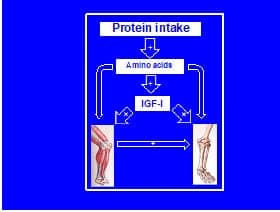Protein is key to building up and maintaining healthy bones and muscle
Protein is essential for numerous structures and functions of the human body from very early life to old age. Bone and skeletal muscle are the two anatomic structures that allow the body to move and without it, the body cannot function properly.
In addition to allowing us to move, bone and skeletal muscle also have other key functions including the regulation of bone mineral, calcium and inorganic phosphate, and the production of hormones that exert an impact on intestinal and renal transport activities.
In a review article published in the journal Hormone Molecular Biology and Clinical Investigation, the authors look at the role that dietary protein plays in bone health and how it stimulates the production of the insulin growth factor (IGF-I).

skeletal health axis. © Jean-Philippe Bonjour/De Gruyter
In the adult body, the amount of protein is about 20%, i.e. approximately 12 to 16 kg for individuals weighing 60 to 80 kg. Together, bone and skeletal muscle contain about 50% of the total mass of body protein.
Constant renewal throughout adulthood
During development, the protein supply from foods is essential for the growth of a healthy body. Once a person reaches adulthood, the protein mass in both bone and skeletal muscle mass is continuously renewed. In the long run, nutrition is also essential for maintaining the protein mass in both bone and skeletal muscle.
Food protein is made of a sequence of several amino acids. Besides its role as brick supplier for bone and skeletal muscle, protein, through its amino acid constituents, influences the production and action of the insulin-like growth factor.
Lack of protein can lead to osteoporosis
During growth, reduction in food protein supply impairs skeletal acquisition. In adulthood, it leads to accelerated loss of bone mass and strength, i.e. osteoporosis, and loss of skeletal muscle mass and strength, i.e. sarcopenia.
Regular intake of protein essential for healthy bones
Human clinical studies underscore the positive effect of increased dietary protein intake on bone and skeletal muscle health.
Furthermore, by increasing the intake of dietary protein, the stimulatory response of bone and skeletal muscle to physical activity is enhanced. In adulthood, there is no evidence that high protein intake could induce body acidosis and thereby be detrimental to bone and skeletal muscle health.
In short, an adequate intake of protein has to be recommended in the prevention of osteoporosis and sarcopenia.
Read the original article here
Jean-Philippe Bonjour: The dietary protein, IGF-I, skeletal health axis. 17.03.2016